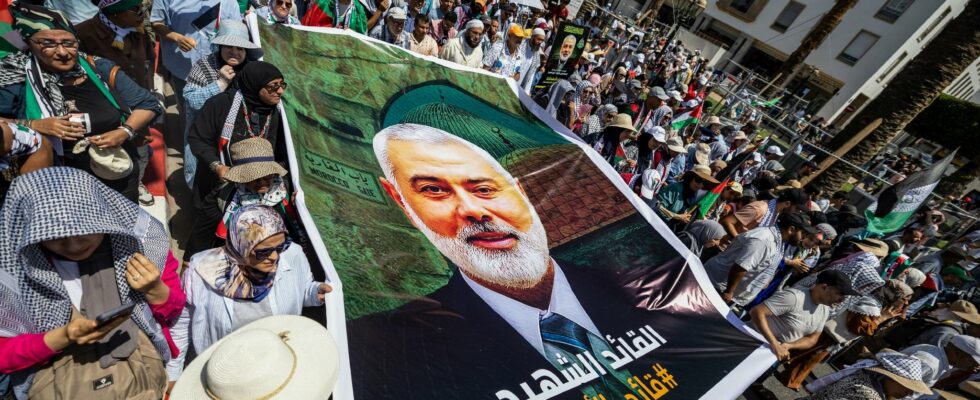The war between Hamas and Israel has been going on for nearly 10 months, and the situation is becoming tense throughout the Middle East. After the death of Hamas’ political leader, Ismail Haniyeh, killed on Wednesday, July 31 in Tehran in a strike attributed to Israel, the international community is wondering about his succession. Especially since the bloody attack of October 7, many leaders of the Islamist organization have been eliminated in strikes. Like Mohammed Deif, head of the armed wing of Hamas on July 13; Marwan Issa, the number three, in March; or Saleh al-Arouri, the number two of the organization, on January 2.
Ismail Haniyeh, who has led Hamas since 2017, was until now seen as a key interlocutor in the ceasefire negotiations in Gaza led by Qatar, the United States and Egypt. Some observers thus point out that his death could strengthen the emergence of even more radical figures in the Palestinian Islamist movement and lead to reprisals against Israel. And, in fact, put an end to any form of negotiation.
Despite the emergence of profiles considered moderate, Hamas members remain committed to an uncompromising approach to the struggle for the existence of a Palestinian state, including by arms. After the assassination of its leader, it would be “politically irrational” to put forward that his successor is inclined to be flexible towards Israel, observes Tahani Mustafa of the International Crisis Group (ICG) to the Associated Press.
An even more radical candidate?
Among the figures identified to take over the leadership of the Islamist movement is Moussa Abou Marzouk. He is one of the founders of Hamas, the first head of its political bureau and deputy director. He is considered to be very close politically to Haniyeh in his pragmatic approach to negotiations. For example, he has spoken out in favor of a “long-term ceasefire” with Israel, and has been in favor of accepting the Palestinian borders drawn after the 1967 Arab-Israeli war, which remains slightly controversial within the movement.
Another serious contender: Khalil al-Haya, the number two in Hamas’ regional political bureau in Gaza. He is known to be close to the head of the armed wing, Yahya Sinwar, and accused by Israel of being one of the masterminds of the October 7 attack. In 2006, Khalil al-Haya led Hamas’ parliamentary bloc, which had just emerged victorious from legislative elections that degenerated into armed clashes with the Fatah movement of Palestinian President Mahmoud Abbas. A fervent supporter of armed struggle, he lost several members of his family during Israeli military operations, notably in 2007 on his house in the northern Gaza Strip.
According to several media outlets, the name of Khaled Meshaal, Ismail Haniyeh’s predecessor, is also circulating. He was propelled to the head of the movement after Israel eliminated Hamas founder Ahmed Yassin, then his successor in the Palestinian territories, Abdelaziz Al-Rantissi. Khaled Meshaal, who has lived in exile since 1967, himself survived an assassination attempt in 1997 in Amman (Jordan) by agents of the Mossad, the Israeli intelligence service. While he maintains good diplomatic relations with Qatar and Turkey, Khaled Meshaal is nevertheless in a more delicate position with Iran, Syria and the Lebanese Hezbollah, major allies of Hamas, because of his support for the Arab Spring protests in 2011.
Finally, the last name mentioned: that of Zaher Jabareen, Hamas’s finance officer and deputy in the West Bank. Zaher Jabareen was close to Ismail Haniyeh, and sometimes even described as one of his right-hand men. Incarcerated in Israeli prisons, he was released in 2011 as part of an exchange of Palestinian prisoners in exchange for the release of Gilad Shalit, an Israeli soldier held hostage for five years. Close to Turkey, where he lived, Zaher Jabareen notably recruited people for large-scale money laundering activities, two of whom were arrested in Israel in 2018. He also participated in deadly operations carried out by Hamas’s armed wing.
Initially refusing to elaborate on the process of replacing their leader, Hamas officials announced that its political institutions would meet shortly to choose a new political leader, without giving a date.
